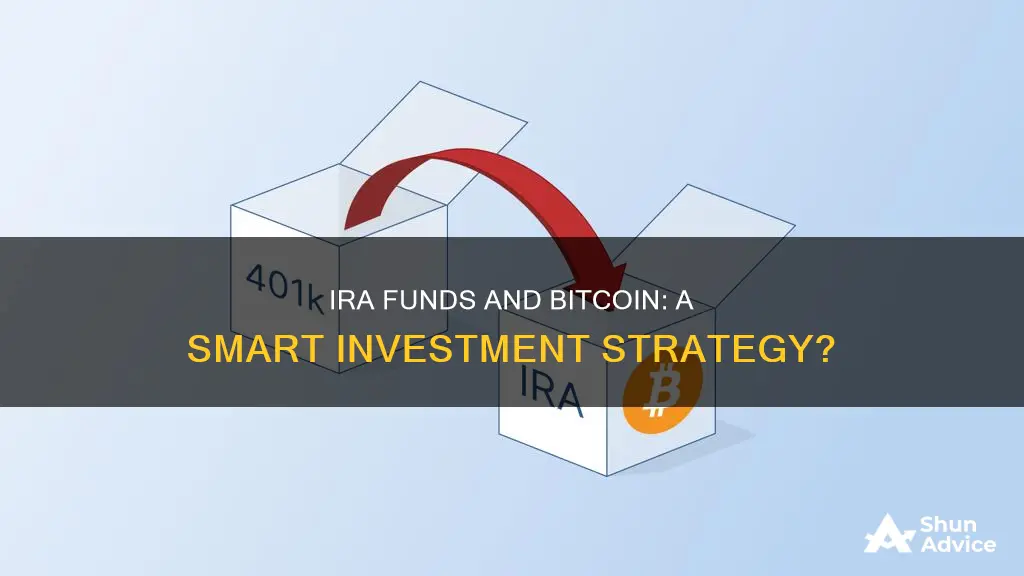
Investing in Bitcoin for retirement is a natural choice for many cryptocurrency fans. They believe in the long-term potential of crypto and understand the substantial risks of holding Bitcoin over the long term. A Bitcoin IRA can provide you with the tax advantages of traditional and Roth IRAs, but there are additional IRS rules and regulations to consider. A Bitcoin IRA is a type of self-directed IRA that is designed to hold cryptocurrency. While it can provide diversification and tax-free gains on profits, there are drawbacks such as high fees and the responsibility of managing your own account.
| Characteristics | Values |
|---|---|
| Type of Account | Self-directed individual retirement account (IRA) |
| Cryptocurrencies | Bitcoin, Ethereum, Litecoin, Stellar Lumens, Zcash, Bitcoin Cash, Ethereum Classic, and others |
| Tax Advantages | No capital gains taxes; tax-deductible contributions in Traditional IRA; no taxes on investments in Roth IRA |
| Custodians | Crypto exchanges, banks and other financial institutions, specialised crypto custodians |
| Security | Military-grade, multi-signature wallets, cold storage, multi-key security |
| Fees | Set-up fees, transaction fees, annual account management fees, trading fees, asset custody fees |
| IRA Contributions | Annual contribution limits: $6,500 for 2023, $7,000 for 2024, $7,500 for 2023 and $8,000 for 2024 if 50 or older |
| IRA Rollover | Possible to roll over funds from existing IRA or 401(k) |
What You'll Learn

What is a Bitcoin IRA?
A Bitcoin IRA is a self-directed individual retirement account (IRA) that allows you to hold cryptocurrencies such as Bitcoin, Ethereum, Litecoin, and Bitcoin Cash. It is a type of investment retirement account (IRA) that includes Bitcoin and other cryptocurrencies within its portfolio.
While Bitcoin IRAs offer the same tax advantages as traditional and Roth IRAs, they are subject to additional IRS rules and regulations. These accounts are directly managed by the account holder and are typically offered by specialised firms, rather than traditional brokerages or banks.
Bitcoin IRAs provide investors with portfolio diversification and the potential for significant gains. However, they also come with higher fees, investment minimums, and the responsibility of self-management. The extreme volatility of cryptocurrencies also makes Bitcoin IRAs a risky choice for individuals approaching retirement.
To open a Bitcoin IRA, individuals must work with custodians that can hold and facilitate cryptocurrency transactions. The process involves setting up an account, transferring funds, and then buying, selling, or swapping cryptocurrencies within the self-directed retirement account.
Bitcoin vs Gold: The Future of Investment Portfolios
You may want to see also

How does a Bitcoin IRA work?
A Bitcoin IRA is a self-directed individual retirement account that can hold cryptocurrencies. In some ways, it works like a conventional IRA, but instead of investing in mutual funds, you're buying cryptocurrency.
There are three components involved in a Bitcoin IRA:
- Crypto exchanges: These facilitate the purchase and sale of crypto held in your Bitcoin IRA.
- Custodians: All self-directed IRAs use custodians to hold your assets and ensure your account adheres to IRS rules. Bitcoin IRAs have specialised crypto custodians.
- Secure storage solutions: These protect your crypto from theft. Most Bitcoin IRA providers use proprietary secure storage methods.
You can choose between a traditional IRA or a Roth IRA, both of which offer substantial tax benefits. The annual contribution limits are the same as a conventional IRA: $6,500 for 2023, or $7,500 if you're 50 or older. In 2024, those limits will be $7,000 and $8,000 if you're 50 or older. You can also roll over funds from an existing IRA or workplace 401(k).
There are several advantages to a Bitcoin IRA, including the potential for greater diversification and higher returns. Additionally, buying and selling crypto in a self-directed IRA can offer tax advantages as you aren't taxed as long as the money and assets remain in your account.
However, there are also some drawbacks. Bitcoin IRAs often come with additional fees, such as set-up, transaction and annual management fees. They can also be more complex to manage, and the volatility of cryptocurrencies means they are a risky investment, especially for those close to retirement.
Acorns Invest in Bitcoin? Exploring Acorns' Crypto Offerings
You may want to see also

How to buy Bitcoin in your IRA
Investing in Bitcoin for retirement is a natural choice for many cryptocurrency fans. They believe in the long-term potential of crypto and understand the substantial risks of holding BTC over the long term. If you want to hold Bitcoin in an individual retirement account, there are several considerations to keep in mind.
A Bitcoin IRA is a type of self-directed IRA that allows you to hold cryptocurrencies. It can provide you with the tax advantages of traditional and Roth IRAs, but it is subject to additional IRS rules and regulations. Here are the steps to buying Bitcoin in your IRA:
Choose a Custodian
Not all IRA custodians offer cryptocurrency investment options, so you must select a custodian that allows Bitcoin investment in an IRA. Some popular custodians that offer Bitcoin investment options include Bitcoin IRA, BitIRA, and Equity Trust Company.
Open a Self-Directed IRA
Once you have chosen a custodian, you need to open a self-directed IRA account. This type of IRA allows you to invest in assets beyond traditional stocks, bonds, and mutual funds.
Fund Your Self-Directed IRA
After opening a self-directed IRA account, you will need to fund it. You can do this by transferring funds from an existing IRA or 401(k), making a contribution, or rolling over a 401(k) into an IRA.
Purchase Bitcoin
Use the funds to purchase Bitcoin through the custodian's platform. The process for buying Bitcoin through an IRA is similar to buying it on a cryptocurrency exchange, but the purchase is made through the IRA custodian.
Store Your Bitcoin
Since your Bitcoin investment is held within your IRA, ensuring secure storage is crucial. Your custodian will likely offer secure storage options, such as cold storage or a multi-signature wallet.
A Beginner's Guide: Investing Bitcoin in the UAE
You may want to see also

Pros and cons of a Bitcoin IRA
A Bitcoin IRA is a self-directed individual retirement account that allows you to hold cryptocurrencies. Here are some pros and cons to consider before investing in a Bitcoin IRA:
Pros:
- Diversification: Bitcoin IRAs allow you to diversify your portfolio beyond traditional stocks, bonds, and commodities, reducing the risk of putting all your funds into one asset.
- Potential for high returns: Bitcoin has the potential for huge gains due to its volatility.
- Tax advantages: Bitcoin IRAs offer tax benefits such as tax-deductible contributions and tax-free gains on profits, depending on the type of IRA.
- Protection against inflation: Bitcoin has a fixed supply, so investors' funds are not impacted by inflation.
- Decentralization: Bitcoin is a decentralized currency, free from the control of central authorities like governments and central banks, ensuring investors' retirement funds remain unchanged.
Cons:
- High fees: Bitcoin IRAs often come with additional fees such as setup fees, transaction fees, and annual account management fees, which can eat into your returns.
- Volatility: Cryptocurrencies like Bitcoin experience significant price fluctuations, making them a risky investment, especially for those close to retirement.
- No tax-loss harvesting: Unlike taxable investment accounts, you cannot take advantage of tax-loss harvesting in a Bitcoin IRA.
- Complexity: Bitcoin IRAs require additional steps and expertise compared to conventional IRAs, and you need to open at least one additional account for your other retirement investments.
- Limited exchange options: Some Bitcoin IRA companies restrict you to trading on affiliated currency exchanges.
Best Bitcoin ETFs: Where to Invest Your Money
You may want to see also

How to open a Bitcoin IRA
A Bitcoin IRA is a self-directed individual retirement account that allows you to hold cryptocurrencies. It can be set up as either a traditional or Roth account.
- Choose a custodian that allows for Bitcoin investment in an IRA. Some popular custodians that offer Bitcoin investment options include Bitcoin IRA, BitIRA, and Equity Trust Company.
- Open a self-directed IRA account. This type of IRA allows you to invest in assets beyond traditional stocks, bonds, and mutual funds.
- Fund your self-directed IRA account. You can do this by transferring funds from an existing IRA or 401(k), making a contribution, or rolling over a 401(k) into an IRA.
- Purchase Bitcoin through the custodian's platform. The process is similar to buying Bitcoin on a cryptocurrency exchange, but the purchase is made through the IRA custodian.
- Store your Bitcoin securely. Your custodian will likely offer secure storage options, such as cold storage or a multi-signature wallet.
It is important to note that Bitcoin IRAs have additional considerations, such as higher fees and volatility, compared to traditional IRAs. Be sure to do your research and understand the risks involved before opening a Bitcoin IRA.
The Pros and Cons of Investing in Bitcoin
You may want to see also
Frequently asked questions
A Bitcoin IRA is a self-directed individual retirement account that is allowed to hold cryptocurrencies.
You can set up a Bitcoin IRA by working with special custodians that can hold and deal in cryptocurrency. You can fund these accounts via a rollover of funds from an existing IRA or another tax-advantaged account, or contribute new funds.
The pros of a Bitcoin IRA include portfolio diversification and tax-free gains on profits.
The cons of a Bitcoin IRA include high fees and the responsibility of managing your own account.
You can buy Bitcoin with a Bitcoin IRA by transferring funds from an existing IRA or 401k into a Bitcoin IRA account.







